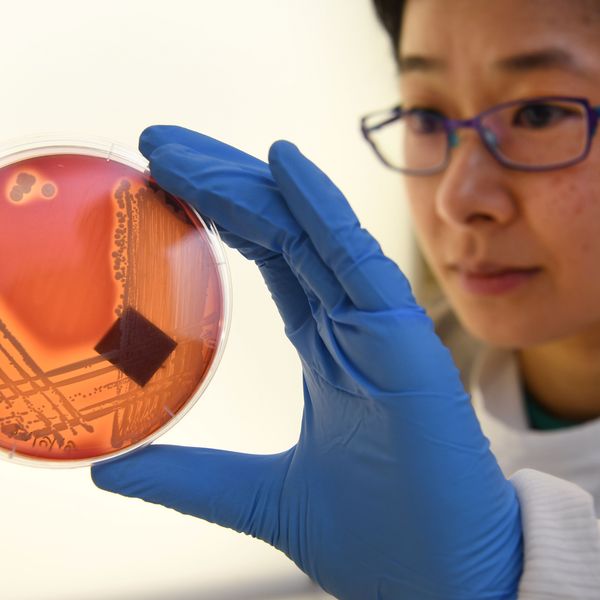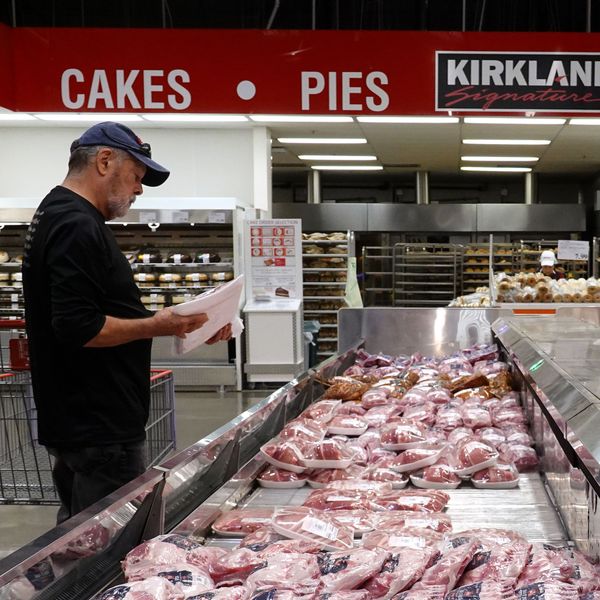Thousands Call on FDA to Stop Turning a Blind Eye to Antibiotics Squandered in Animal Feed
A week ago with most of us still digesting election results--and our turkey--a critical deadline passed in the struggle to convince the Food and Drug Administration (FDA) to pull back the cloak of ignorance around how antibiotics are being fed or given to pigs, chickens, turkeys and cattle in animal agriculture.
A week ago with most of us still digesting election results--and our turkey--a critical deadline passed in the struggle to convince the Food and Drug Administration (FDA) to pull back the cloak of ignorance around how antibiotics are being fed or given to pigs, chickens, turkeys and cattle in animal agriculture.

- More than 440 doctors, nurses and other members of the Healthy Food Action network, and from Health Care Without Harm
- More than 14,000 members submitted comments via Food and Water Watch
- Another 10,158 people responded as participants of Pew Charitable Trusts' Save Antibiotics Campaign
- More than 38 organizations signed onto a letter by Keep Antibiotics Working to the FDA with similar concerns. The organizations included the American Academy of Pediatrics and three of its chapters; state medical, nursing or public health associations in six different states; as well as other farming, environmental, veterinarian and consumer-focused groups.
Here's why public data on antibiotic sales for animals is critical. Microbiology 101 says that the more you use antibiotics, the quicker antibiotic resistance develops. With the U.S. producing more than 9 billion such animals a year, the huge and routine use of antibiotics in these operations creates a perfect storm for the creation and spread of superbugs to humans. On farms, resistance spreads via farmers and workers directly, via manure in waterways and indirectly via contaminated meat.
Since 2009, the FDA's has collected some information. We now know nearly 30 million pounds of antibiotics are used in U.S. food animals each year--four times the amount prescribed for treating human infections. Ninety percent of them are not injected into sick animals but rather put into animal feed or drinking water. Unfortunately, that's virtually all we know.
More worrisome is the fact that FDA has refused to collect and make public information from Big Pharma about exactly which drugs they sell for use in particular kinds of animals (turkey flocks, for example), and for what purpose. In fact, just today the Government Accountability Project filed suit against the FDA, charging it with wrongfully withholding from the public some of the data on sales of animal antibiotics that it did collect.
Without this information, it's hard to envision progress happening in the fight to curb the needless use of penicillins, tetracyclines and other human antibiotics for purely economic reasons, like making pigs or chickens grow faster on less feed. Every indication is that most animal antibiotics now sold are avoidable.
Who're the losers of FDA turning a blind eye? You, me--virtually anyone who stands to suffer from ineffective antibiotics when they really need them. The winners, until now, have of course been Big Pharma. So long as no one questions how and where antibiotics get used in food production, they keep profiting from selling more of these precious drugs than they ought to.
An Urgent Message From Our Co-Founder
Dear Common Dreams reader, The U.S. is on a fast track to authoritarianism like nothing I've ever seen. Meanwhile, corporate news outlets are utterly capitulating to Trump, twisting their coverage to avoid drawing his ire while lining up to stuff cash in his pockets. That's why I believe that Common Dreams is doing the best and most consequential reporting that we've ever done. Our small but mighty team is a progressive reporting powerhouse, covering the news every day that the corporate media never will. Our mission has always been simple: To inform. To inspire. And to ignite change for the common good. Now here's the key piece that I want all our readers to understand: None of this would be possible without your financial support. That's not just some fundraising cliche. It's the absolute and literal truth. We don't accept corporate advertising and never will. We don't have a paywall because we don't think people should be blocked from critical news based on their ability to pay. Everything we do is funded by the donations of readers like you. Will you donate now to help power the nonprofit, independent reporting of Common Dreams? Thank you for being a vital member of our community. Together, we can keep independent journalism alive when it’s needed most. - Craig Brown, Co-founder |
A week ago with most of us still digesting election results--and our turkey--a critical deadline passed in the struggle to convince the Food and Drug Administration (FDA) to pull back the cloak of ignorance around how antibiotics are being fed or given to pigs, chickens, turkeys and cattle in animal agriculture.

- More than 440 doctors, nurses and other members of the Healthy Food Action network, and from Health Care Without Harm
- More than 14,000 members submitted comments via Food and Water Watch
- Another 10,158 people responded as participants of Pew Charitable Trusts' Save Antibiotics Campaign
- More than 38 organizations signed onto a letter by Keep Antibiotics Working to the FDA with similar concerns. The organizations included the American Academy of Pediatrics and three of its chapters; state medical, nursing or public health associations in six different states; as well as other farming, environmental, veterinarian and consumer-focused groups.
Here's why public data on antibiotic sales for animals is critical. Microbiology 101 says that the more you use antibiotics, the quicker antibiotic resistance develops. With the U.S. producing more than 9 billion such animals a year, the huge and routine use of antibiotics in these operations creates a perfect storm for the creation and spread of superbugs to humans. On farms, resistance spreads via farmers and workers directly, via manure in waterways and indirectly via contaminated meat.
Since 2009, the FDA's has collected some information. We now know nearly 30 million pounds of antibiotics are used in U.S. food animals each year--four times the amount prescribed for treating human infections. Ninety percent of them are not injected into sick animals but rather put into animal feed or drinking water. Unfortunately, that's virtually all we know.
More worrisome is the fact that FDA has refused to collect and make public information from Big Pharma about exactly which drugs they sell for use in particular kinds of animals (turkey flocks, for example), and for what purpose. In fact, just today the Government Accountability Project filed suit against the FDA, charging it with wrongfully withholding from the public some of the data on sales of animal antibiotics that it did collect.
Without this information, it's hard to envision progress happening in the fight to curb the needless use of penicillins, tetracyclines and other human antibiotics for purely economic reasons, like making pigs or chickens grow faster on less feed. Every indication is that most animal antibiotics now sold are avoidable.
Who're the losers of FDA turning a blind eye? You, me--virtually anyone who stands to suffer from ineffective antibiotics when they really need them. The winners, until now, have of course been Big Pharma. So long as no one questions how and where antibiotics get used in food production, they keep profiting from selling more of these precious drugs than they ought to.
A week ago with most of us still digesting election results--and our turkey--a critical deadline passed in the struggle to convince the Food and Drug Administration (FDA) to pull back the cloak of ignorance around how antibiotics are being fed or given to pigs, chickens, turkeys and cattle in animal agriculture.

- More than 440 doctors, nurses and other members of the Healthy Food Action network, and from Health Care Without Harm
- More than 14,000 members submitted comments via Food and Water Watch
- Another 10,158 people responded as participants of Pew Charitable Trusts' Save Antibiotics Campaign
- More than 38 organizations signed onto a letter by Keep Antibiotics Working to the FDA with similar concerns. The organizations included the American Academy of Pediatrics and three of its chapters; state medical, nursing or public health associations in six different states; as well as other farming, environmental, veterinarian and consumer-focused groups.
Here's why public data on antibiotic sales for animals is critical. Microbiology 101 says that the more you use antibiotics, the quicker antibiotic resistance develops. With the U.S. producing more than 9 billion such animals a year, the huge and routine use of antibiotics in these operations creates a perfect storm for the creation and spread of superbugs to humans. On farms, resistance spreads via farmers and workers directly, via manure in waterways and indirectly via contaminated meat.
Since 2009, the FDA's has collected some information. We now know nearly 30 million pounds of antibiotics are used in U.S. food animals each year--four times the amount prescribed for treating human infections. Ninety percent of them are not injected into sick animals but rather put into animal feed or drinking water. Unfortunately, that's virtually all we know.
More worrisome is the fact that FDA has refused to collect and make public information from Big Pharma about exactly which drugs they sell for use in particular kinds of animals (turkey flocks, for example), and for what purpose. In fact, just today the Government Accountability Project filed suit against the FDA, charging it with wrongfully withholding from the public some of the data on sales of animal antibiotics that it did collect.
Without this information, it's hard to envision progress happening in the fight to curb the needless use of penicillins, tetracyclines and other human antibiotics for purely economic reasons, like making pigs or chickens grow faster on less feed. Every indication is that most animal antibiotics now sold are avoidable.
Who're the losers of FDA turning a blind eye? You, me--virtually anyone who stands to suffer from ineffective antibiotics when they really need them. The winners, until now, have of course been Big Pharma. So long as no one questions how and where antibiotics get used in food production, they keep profiting from selling more of these precious drugs than they ought to.

